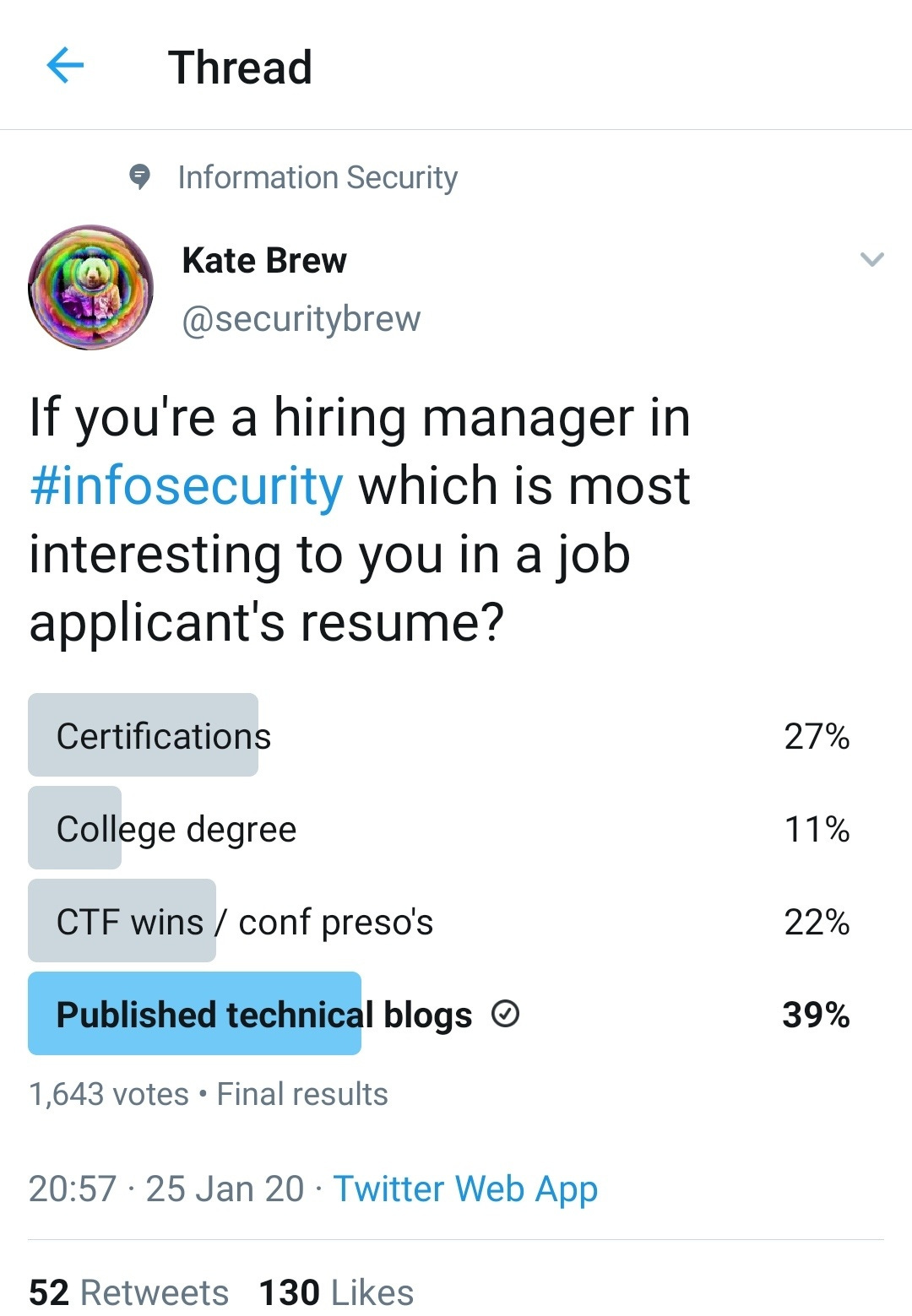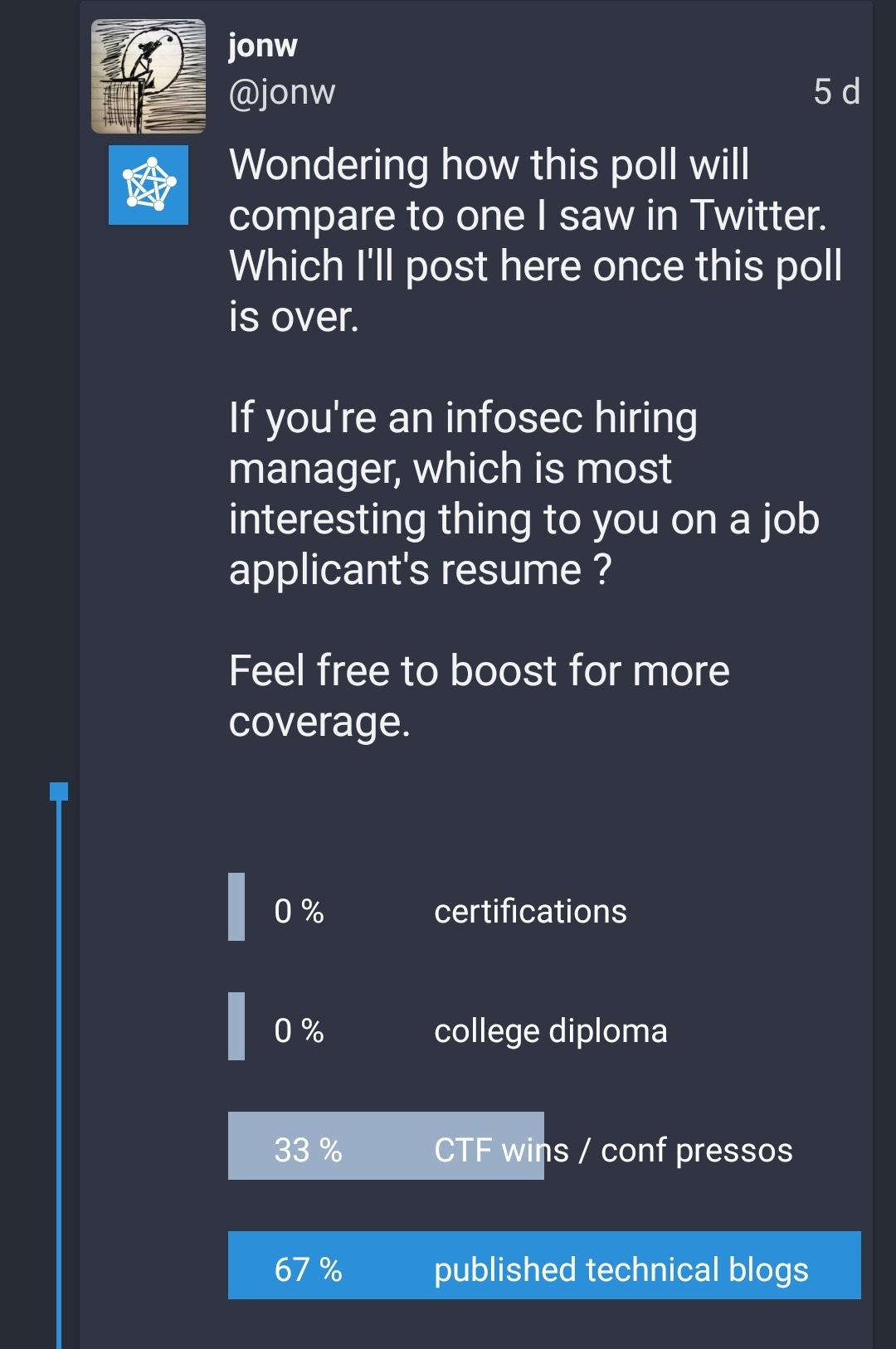Using Your Blog As A Resume
I have been working as a Linux systems administrator full time since 2006. I started dabbling in Linux in 2002 and set up my first mail server using Debian GNU/Linux in 2003. I became such a fan that I wrote articles for Linux magazines and produced a Linux podcast for years. While there certainly are more skilled Linux admins than I, there aren’t many that have broader experience. I’ve recently learned that Information Security (Infosec) hiring managers are weighting experience much higher than degrees or certifications these days which restores some of my faith in the Infosec hiring practices.
If you work in tech at all, you have probably seen job postings that contain elements that don’t make sense. The two common jobs posting faux pas I’ve seen are the “Junior” positions with 5 years experience and the demand for more years experience in some technology that has not been around that long yet. In general terms, junior positions are 1-5 years, intermediate 5-10 years, and senior 10+ years. However, in today’s fast-moving tech climate, those margins have mostly collapsed. It’s not uncommon to see a developer with 3 years experience in a technology to be given a senior role which is a nod to the fact that companies are starting to recognize that aptitude trumps individual skill matching.
Resumes are dysfunctional
The Resume is broken. Its principal function is to summarize relevant background experience for someone to review. Usually, resumes are used for job hunting and it is becoming increasingly harder for all parties in the job hunt to make use of traditional resumes. The average tech worker uses tens, perhaps hundreds, of tools per day just to get by, and only some of those tools are directly related to their job. Hiring managers are finding it hard to determine what, exactly, this person knows based on a three-line job description on a resume. The magic that needs to happen for a legitimately good candidate to get through a proper screening process and into the interview stage is astounding. And, let’s face it, it doesn’t work very well. We’ve all worked with people who somehow got through the hiring funnel and obviously should not.
Education is always behind the curve
It is tough to be critical about formal education, but it is not as strong an indicator in tech as it is in other fields. Certainly, tech workers need skills and some method of schooling is a good place to get some of those skills. But, the sad fact is that education is a business in North America. Less so in Canada than in the US, but we’re getting there. When education becomes a business, it starts to fail in its role. It puts together course content on the skills industry is looking for today without regard to the fact that the current crop of students won’t be in the workforce for a few years, which is a lifetime in tech. Many of the skills students are learning today in tech programs will not be needed 2-3 years from now.
If education isn’t producing the skills we need now, and resumes are dysfunctional, what are we supposed to do? Today’s hiring managers have some ideas.
I ran across a poll on Twitter that asked Infosec hiring managers to vote on the things they use most to determine a candidate’s suitability for a role. The options were:
Certifications
College degree
Capture The Flag (CTF) wins/Conference presentations
Published technical blogs.
Almost 1,650 people votes and “Published technical blogs” overwhelmingly won the poll with certifications coming in a distant second. Formal college education barely tipped the scales at all.
The results of this poll resonate with me. One of the nice things about working in any IT specialization is that the entire field is “horizontal”. By that I mean an IT worker has the opportunity to work in virtually any field. As an example, I’ve always worked in the tech discipline, but have worked in the defence, entertainment, financial, and security fields during my career. My education hasn’t changed since I graduated but my experience has and the easiest place to see that growth is through writing and presentations.
The technical blog makes a very good substitute for the resume. Instead of having to glean the breadth of the skillset an applicant has from a three-line job description on a resume, a hiring manager can see for herself, first hand, by visiting the workers’ site and seeing the topics she writes about. That is useful for the hiring manager, but it is also very useful for the worker.
It is very difficult to know what to include on a resume due to the emphasis put on keeping it succinct. For example, I have been working with Berkely Packet Filters recently. I had never hard of BPF until about 6 months ago and once I am finished this project I may never work with the technology again. If I were to put a resume together later this year, I would probably decide to not include the BPF info because there are so many more technologies that I work with more frequently. Therefore, a potential hiring manager would have no clue that I know anything about BPF from my resume. But, upon visiting my writing, lo and behold, there is an article about BPF I wrote. The blog is an extended resume that more accurately reflects what workers know, the technologies they’ve come in contact with, and how adaptable they are to different technologies.
I re-ran the same survey on my Fediverse account and although the number of respondents was much lower, the results were essentially the same. Given that there is almost no overlap between the Twitter and Fediverse audience here, this is a good confirmation.
Some final thoughts
To my knowledge, I’ve never been offered a position based on my writing, so I can’t say empirically that these polls are correct. I also think it is important to note that these polls were, at least ostensibly, answered by hiring managers. Hiring managers are not recruiters and a very large challenge of any tech job hunt is getting through the recruiters. Recruiters make their money on what is essentially a commission. They’re salespeople at the core and as such, they want to be as efficient as possible and are always honing their skills to derive the most income from the least amount of work. Therefore, workers with the terms in their resume that recruiters are looking for are going to get put in front of hiring managers. So, while it is nice to know that many hiring managers do consider tech blogs as a reliable indicator of ability, I don’t think that makes it any easier to get in front of those hiring managers. Until recruiters change their tact to more carefully consider applicants, that battle will probably still be won and lost by acronym stuffing to trigger the algorithms that get the resume in front of the recruiter.
- * *
If you are not currently a paid subscriber and like my work, please consider supporting me with a paid subscription. You will get at least one extra post per week, the ability to comment and like these posts on the web, and encourage me to keep going! I’m including a 50% off subscription button below for you to use. Thank you!
my shorter content on the fediverse: https://cosocial.ca/@jonw


